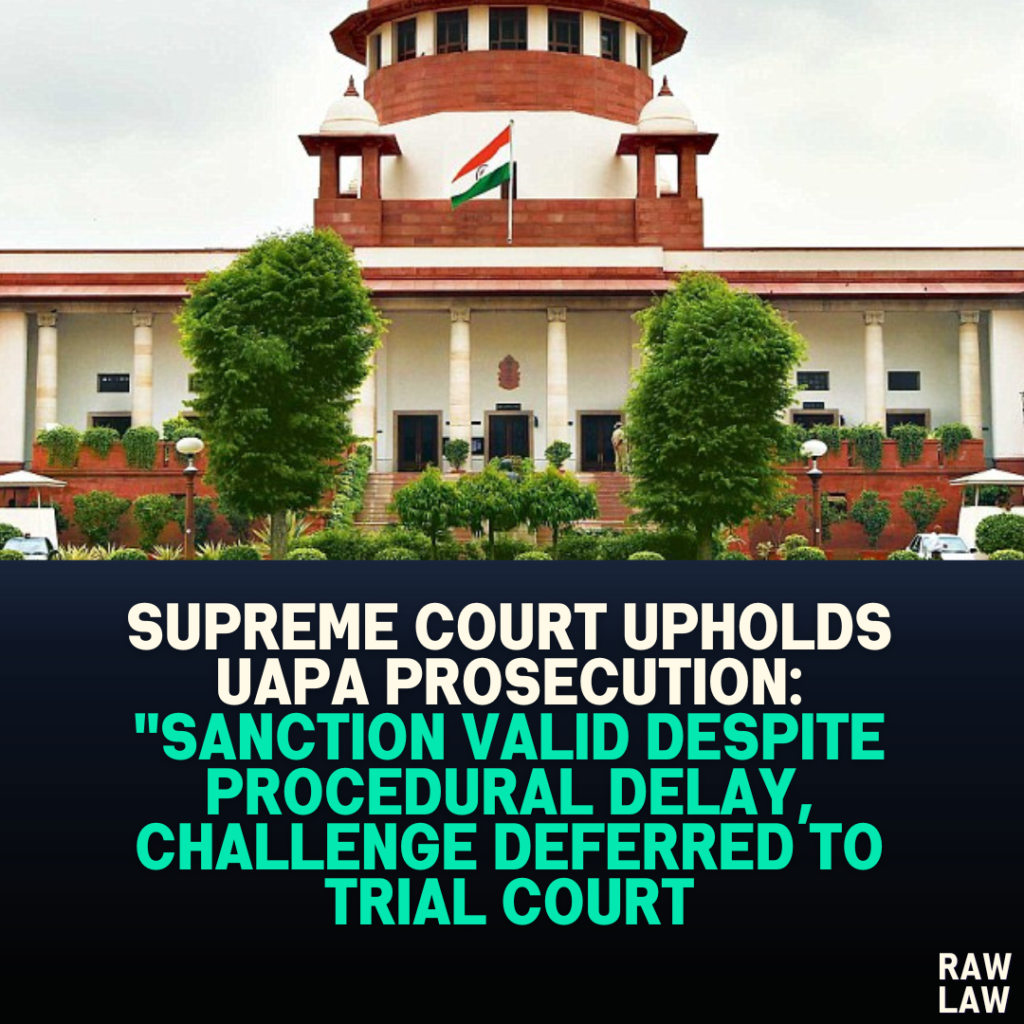Court’s Decision
The Supreme Court dismissed the appeal and upheld the impugned judgment of the High Court of Jharkhand. It held that there was no violation of statutory procedures in granting the sanction for prosecution and that the issues raised by the appellant could be dealt with during the trial. The challenge to the validity of the sanction order was left open to be raised before the Trial Judge. The Court did not interfere with the ongoing trial, as 113 out of 125 witnesses had already been examined.
Facts
The appellant, a director of M/s. Shiv Shakti Samridhi Infra Pvt. Ltd., was accused of being associated with the People’s Liberation Front of India (PLFI), an unlawful association involved in extortion and terrorist activities. The allegations stem from an FIR registered in 2016, followed by a series of investigations, chargesheets, and sanctions. The appellant was arrested in July 2020 after being implicated in transactions allegedly linked to the proceeds of terrorism.
Issues
Whether the validity of the sanction order can be challenged at any stage of the proceedings.
Whether the violation of Section 45(2) of the UAPA and the related rules, regarding statutory timelines and independent review, vitiates the proceedings.
Whether the appellant’s involvement in the transactions was independent of those involving other accused.
Whether the statutory exemption under Section 22A of the UAPA applies to the appellant, given his claim of being unaware of the company’s affairs.
Petitioner’s Arguments
The appellant contended that:The sanction for prosecution was not granted in accordance with statutory requirements, as it was issued almost three years after the incident without proper independent review.
There was a mechanical application of mind in the issuance of the sanction order, making it invalid.
The appellant was not involved in the initial transaction for which other accused were prosecuted and was wrongly implicated later.
The appellant was merely a daily wage worker, whose identity was exploited by the main accused to set up the company involved in the alleged money laundering.
Respondent’s Arguments
The Union of India argued that: The sanction was granted after due process, including an independent review by competent authorities.
The timelines prescribed under the UAPA and its rules were adhered to, and there was no non-application of mind.
The appellant’s role as a director in the company that laundered funds for the PLFI was well established, and his claim of identity theft was unfounded.
The trial had reached an advanced stage, and there was no basis to quash the proceedings at this juncture.
Analysis of the Law
The Court analyzed the statutory provisions under Section 45 of the UAPA, which mandates prior sanction for prosecution after an independent review of the evidence. It referred to various precedents, including judgments on the importance of timely and independent sanction orders in criminal proceedings. The Court examined whether the timelines prescribed by the UAPA and its rules were mandatory or directory, concluding that a minor delay would not vitiate the process unless it led to a miscarriage of justice.
Precedent Analysis
The Court referred to several judgments, including Pradeep Ram v. State of Jharkhand and Bhushan Kumar v. State (NCT of Delhi), to support its conclusion that the National Investigation Agency (NIA) was competent to conduct further investigations and that the sanction process was legally sound.
Court’s Reasoning
The Supreme Court reasoned that while the appellant was allowed to challenge the validity of the sanction order, this should be done before the trial court. The procedural aspects of granting the sanction were found to be in compliance with the law, and there was no evidence of prejudice to the appellant. The Court also noted that the trial had progressed significantly, and quashing the proceedings at this stage would be inappropriate.
Conclusion
The appeal was dismissed, and the appellant was directed to raise the issue of the validity of the sanction order before the trial court.
Implications
The ruling reinforces the legal principle that procedural irregularities, such as delays in granting sanctions, must be substantial to vitiate criminal proceedings. It also underscores the Court’s reluctance to interfere in ongoing trials, especially when they have reached an advanced stage.




Pingback: Chhattisgarh High Court Orders Probe into Police Misconduct Allegations: Officer Used Vulgar and Obscene Language, Misbehaved with Lady Petitioner, and Threatened False Implication if She Did Not Cooperate - Raw Law